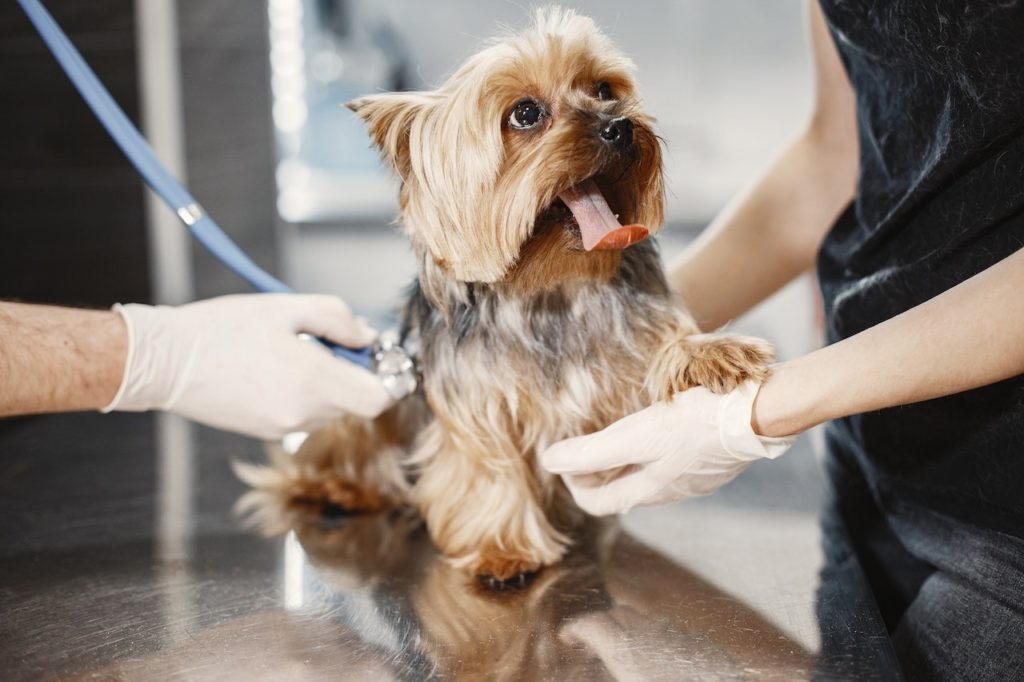Taking your furry friend to the vet is an essential part of being a responsible dog owner, but have you ever wondered how often you should be making these visits? Well, we’ve got you covered! In this article, we will explore the ideal frequency for vet visits for your canine companion. Whether you have a playful pup or a wise old pooch, read on to discover all the necessary information to ensure your four-legged friend stays happy and healthy.
General Guidelines
Age
The frequency of veterinary visits for your dog will depend on their age. Puppies require more frequent visits compared to adult and senior dogs. As a general guideline, puppies should have more frequent visits in the first year of their life to ensure their growth and development is on track.
Breed
Different breeds may have varying health needs and predispositions to certain conditions. It is important to consult with your veterinarian to determine the specific healthcare requirements for your dog’s breed. Certain breeds may require more frequent check-ups or specialized care.
Vaccination Schedule
Vaccinations are crucial to protect your dog from various contagious diseases. Puppies will usually need a series of vaccinations to establish immunity. Adult dogs will require booster shots to maintain their protection. Your veterinarian will provide a vaccination schedule and recommend the necessary vaccines for your dog based on their lifestyle and risk factors.
Overall Health
Regular veterinary visits help to assess and maintain your dog’s overall health. These visits allow the veterinarian to monitor your dog’s weight, body condition, and general well-being. Catching any potential health issues early can improve outcomes and prevent more serious problems down the line.
Veterinarian’s Recommendation
Your veterinarian is the best resource for determining how often your dog should visit. They will take into account factors such as age, breed, lifestyle, and any pre-existing conditions to create a personalized healthcare plan for your furry friend. It is important to follow their recommendations for regular check-ups and preventive care.
Puppy Stage
First Vet Visit
Bringing your new puppy to the veterinarian within the first few weeks of getting them is crucial. This initial visit allows the vet to conduct a thorough health examination, check for any congenital abnormalities, and provide advice on diet, training, and general care. It is also an opportunity for you to ask any questions and address any concerns you may have as a new puppy owner.
Immunizations
Puppies are especially vulnerable to contagious diseases, which is why a series of vaccinations are necessary to protect them. The first round of shots typically includes vaccines for distemper, parvovirus, and adenovirus, among others. These vaccines will need to be administered in a series, usually three to four weeks apart, until the puppy is around four months old. Your veterinarian will inform you of the specific vaccination schedule for your puppy.
Parasite Prevention
Puppies are prone to parasites such as fleas, ticks, and worms. Your veterinarian will recommend appropriate preventive measures to protect your puppy from these pests. This may include regular use of flea and tick preventives, deworming medication, and education on how to prevent your puppy from ingesting parasites, such as by avoiding contact with contaminated soil or feces.
Wellness Exams
Regular wellness exams are essential for monitoring your puppy’s growth and development. During these visits, the veterinarian will assess your puppy’s overall health, evaluate their weight, check for signs of parasites, and provide guidance on nutrition and exercise. This is also an ideal time to discuss any behavioral concerns or training strategies.
Adult Stage
Annual Check-ups
Once your dog reaches adulthood, annual check-ups are generally recommended to ensure their continued well-being. These visits give the veterinarian an opportunity to assess your dog’s overall health, identify any emerging issues, and update vaccinations and preventive care as needed. Regular check-ups can help detect and address any health concerns before they become more serious.
Vaccinations
While some vaccines may be administered on a three-year schedule for adult dogs, certain vaccines still require annual boosters. These may include vaccines for diseases such as rabies, leptospirosis, and bordetella. Your veterinarian will determine the appropriate vaccination schedule for your adult dog based on their lifestyle and risk factors.
Parasite Control
Parasite prevention remains important throughout your dog’s life. Adult dogs can still be vulnerable to fleas, ticks, and worms, particularly if they spend time outdoors or interact with other animals. Your veterinarian will recommend appropriate preventives and conduct regular screenings for parasites to ensure your dog stays protected.
Dental Care
Dental health is often overlooked but is crucial for your dog’s overall well-being. Regular dental check-ups are essential for maintaining good oral hygiene and preventing periodontal disease. Your veterinarian can perform dental cleanings, provide advice on at-home dental care, and address any dental issues that may arise.
Blood Tests
As dogs age, regular blood tests become increasingly important for monitoring their health. These tests can provide valuable information about organ function, detect early signs of diseases such as diabetes or kidney problems, and assess the effectiveness of medications. Blood tests may be recommended annually or more frequently if your dog has certain health conditions or is on long-term medications.

Senior Stage
Bi-annual Check-ups
Once your dog enters their senior years, bi-annual check-ups are highly recommended. Aging dogs are more prone to developing health issues, and more frequent visits allow their veterinarian to closely monitor their condition. These check-ups provide an opportunity to address any age-related concerns, adjust medications or treatments, and ensure your senior dog is receiving the best possible care.
Arthritis Management
As dogs age, arthritis and joint-related issues can become more prevalent. Regular check-ups allow your veterinarian to assess your senior dog’s mobility, provide pain management strategies, and recommend appropriate supplements or medications to support joint health. They can also offer advice on exercise modifications and environmental adjustments to enhance your dog’s comfort.
Nutrition and Weight
Maintaining a healthy weight is crucial for senior dogs, as excess weight can exacerbate age-related health conditions. Regular check-ups allow your veterinarian to monitor your dog’s weight, assess their nutritional needs, and recommend any necessary dietary modifications. Proper nutrition can support your senior dog’s overall health and enhance their quality of life.
Eye and Ear Health
Senior dogs may experience changes in their vision and hearing. Regular check-ups allow the veterinarian to monitor your dog’s eye and ear health, identify any age-related issues, and provide appropriate treatment or management strategies. Early detection and intervention can help mitigate the impact of these changes on your dog’s daily life.
Mobility Assessment
As your dog ages, their mobility may decline due to arthritis or other age-related conditions. Regular check-ups provide an opportunity to assess your senior dog’s mobility, monitor the progression of any conditions, and recommend appropriate interventions such as physical therapy, mobility aids, or pain management medications. Your veterinarian can work with you to create a care plan tailored to your dog’s specific needs.

Specific Situations
Illness or Injury
When your dog is sick or injured, it is important to consult with your veterinarian promptly. They can assess the situation, provide appropriate treatment, and offer guidance on home care. Regular veterinary visits are especially crucial for monitoring and managing chronic or recurring illnesses, as well as administering ongoing treatments.
Behavioral Concerns
If you notice any behavioral changes in your dog, such as increased aggression, anxiety, or unusual habits, it is recommended to consult with your veterinarian. They can help determine if there are any underlying medical causes for the behavioral changes or recommend behavioral training techniques or medications to address the issue.
Surgery or Medical Procedures
If your dog requires surgery or any other medical procedures, regular veterinary visits are necessary to ensure proper post-operative care. These visits allow the veterinarian to monitor your dog’s healing progress, change dressings if needed, and adjust medications or treatments. Close follow-up is crucial to ensure your dog recovers successfully.
Medication or Treatment Adjustment
If your dog is on long-term medications or undergoing specific treatments, regular veterinary visits are essential for monitoring their effectiveness and adjusting them as needed. Your veterinarian will assess any changes in your dog’s condition, conduct necessary tests, and make recommendations to optimize their treatment plan for the best possible outcomes.
Preventive Care
Annual Physical Examinations
Annual physical examinations are an important part of preventive care. These examinations allow your veterinarian to assess your dog’s overall health, detect any potential issues early on, and provide appropriate preventive measures.
Vaccinations and Booster Shots
Routine vaccinations are a key aspect of preventive care. Regular boosters help maintain your dog’s immunity against various diseases. Your veterinarian will administer the necessary vaccines and advise on the appropriate schedule based on your dog’s lifestyle and risk factors.
Heartworm Testing and Prevention
Heartworm disease can be life-threatening for dogs. Regular heartworm testing, usually done annually, allows for early detection and timely intervention. Your veterinarian can recommend the appropriate preventive medications to protect your dog from heartworm infection.
Tick and Flea Control
Ticks and fleas can cause a range of health issues for your dog, including skin irritations, allergies, and the transmission of diseases. Regular use of preventive products is crucial to protect your dog from these parasites. Your veterinarian can recommend the most effective tick and flea control options based on the specific needs and lifestyle of your dog.
Regular Dental Check-ups
Regular dental check-ups are an important part of preventive care. Dental cleanings, as well as at-home dental hygiene practices, can help prevent the buildup of plaque and tartar, reducing the risk of periodontal disease and other oral health issues. Your veterinarian can provide guidance on proper dental care for your dog.

Special Considerations
Working or Service Dogs
Working dogs and service dogs often have unique healthcare needs due to their high level of physical activity and the demands of their jobs. Regular veterinary visits are essential to ensure the health and well-being of these dogs. Your veterinarian can provide guidance on preventive care, stress management, and any specific health concerns related to their working duties.
Pregnancy and Lactation
If your dog is pregnant or nursing, regular veterinary care becomes even more important. The veterinarian can monitor the progress of the pregnancy, provide nutritional advice, and guide you through the whelping process. Postnatal care will include regular check-ups for the mother and her puppies to ensure their health and development.
Travel or Boarding
If you plan to travel with your dog or need to place them in a boarding facility, it is important to consult with your veterinarian beforehand. They can recommend any necessary vaccinations or preventive measures to protect your dog from contagious diseases that they may encounter during their travels or while in a boarding facility.
Chronic Health Conditions
If your dog has a chronic health condition, such as diabetes, allergies, or arthritis, regular veterinary visits are crucial for managing their condition and making any necessary adjustments to their treatment plan. Your veterinarian can closely monitor your dog’s health, provide ongoing support, and make recommendations based on their specific needs.
Emergency Situations
Sudden Illness
If your dog experiences a sudden illness, it is important to seek veterinary care immediately. Symptoms such as vomiting, diarrhea, lethargy, difficulty breathing, or loss of appetite should not be ignored. Quick action can be crucial in diagnosing and treating the underlying cause of the illness and improving your dog’s chances of recovery.
Accidents or Trauma
In the case of accidents or trauma, such as car accidents or falls, it is crucial to seek emergency veterinary care immediately, regardless of whether your dog appears injured or not. Internal injuries or other potentially life-threatening conditions may not be externally visible, and prompt medical attention can play a vital role in saving your dog’s life.
Ingestion of Toxic Substances
If your dog ingests a toxic substance, such as certain foods, medications, or household chemicals, it is important to contact your veterinarian or a veterinary emergency clinic immediately. They can provide guidance on what steps to take and if necessary, induce vomiting or administer appropriate treatments to minimize the effects of the toxin.
Difficulty Breathing or Collapse
If your dog experiences difficulty breathing, collapse, or any other signs of respiratory distress, immediate veterinary care is crucial. These symptoms can indicate a serious underlying medical condition or an emergency situation requiring immediate intervention to ensure your dog’s breathing is restored and their condition stabilized.

Consulting with Your Veterinarian
Individual Health Needs
Every dog has unique health needs and considerations. Regular consultations with your veterinarian allow them to assess your dog’s individual health status, address any concerns, and provide personalized recommendations for their care. Your veterinarian is your best resource for understanding and meeting your dog’s unique needs.
Risk Assessment
Your veterinarian can help assess the specific risks and health concerns that may be relevant to your dog based on factors such as age, breed, lifestyle, and geographic location. They can then provide tailored advice on preventive measures, such as vaccines, parasite control, and dietary recommendations, to minimize these risks and keep your dog healthy.
Follow-up Appointments
Regular follow-up appointments are important to monitor your dog’s progress and ensure that any treatments or interventions are effective. These appointments allow your veterinarian to make any necessary adjustments to their care plan and address any new or ongoing health concerns.
Counseling and Support
Veterinary visits provide an opportunity for you to discuss any concerns, ask questions, and seek guidance from your veterinarian. They can offer insights on behavior management, training strategies, nutrition, and general pet care. Building a strong partnership with your veterinarian ensures that you have a supportive resource to turn to for any questions or concerns regarding your dog’s well-being.
Conclusion
Regular veterinary care is crucial to ensuring the overall health and well-being of your dog throughout their life. From their puppy stage to their senior years, regular check-ups, vaccinations, preventive care, and timely intervention are essential. By staying proactive and attentive to your dog’s changing needs, you can provide them with the best possible care and enjoy many happy and healthy years together. Remember, your veterinarian is your ally in maintaining your dog’s health, so consult them regularly and trust their expertise.

